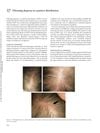 August 2021 in “Clinical and Experimental Dermatology”
August 2021 in “Clinical and Experimental Dermatology” Children under 10 can experience hair thinning without hormone issues, and it may improve with treatment.
 March 2021 in “Journal of Maxillofacial and Oral Surgery”
March 2021 in “Journal of Maxillofacial and Oral Surgery” Beard hair can be used for hair transplants in severe alopecia cases, with minimal complications and good results.
 April 2019 in “Advances in Cosmetic Surgery”
April 2019 in “Advances in Cosmetic Surgery” The document concludes that ongoing medical therapy is crucial for preventing hair loss, and surgical options can restore hair, with future treatments for hair loss being promising.

Forensic hair analysis for drugs is now more reliable and accurate.

Modern hair restoration techniques can effectively treat hair loss and provide natural-looking results.
 April 2012 in “Informa Healthcare eBooks”
April 2012 in “Informa Healthcare eBooks” Fibrosing alopecia in a pattern distribution is a unique hair loss condition with inflammation and scarring, resembling but distinct from common balding.
 February 2006 in “Journal of The American Academy of Dermatology”
February 2006 in “Journal of The American Academy of Dermatology” Terbinafine is more effective than itraconazole for toenail fungus, especially in older patients, and debridement improves its effectiveness.
 April 2024 in “Academic dermatology”
April 2024 in “Academic dermatology” Dermatologists should carefully manage hair loss in cancer patients to improve their quality of life.
 July 2015 in “Cambridge University Press eBooks”
July 2015 in “Cambridge University Press eBooks” Androgens like testosterone affect skin health and can lead to conditions such as acne and hair loss, with various treatments available.
 January 2018 in “Sohag Medical Journal”
January 2018 in “Sohag Medical Journal” Combining topical dutasteride with microneedling is more effective for hair growth than microneedling alone.

Topical minoxidil helps treat hair loss in teens, but more research needed for safe options.
 August 2002 in “Dermatologic Surgery”
August 2002 in “Dermatologic Surgery” Fluridil safely promotes hair growth in men with androgenetic alopecia.
1 citations,
July 2022 in “British Journal of Dermatology” Targeting specific genes in certain pathways may help treat male pattern baldness.
 August 2023 in “Skin Research and Technology”
August 2023 in “Skin Research and Technology” Measuring bald patch size can help grade hair loss severity, with photograph-based evaluation being more reliable.
 4 citations,
July 2015 in “Case Reports in Dermatology”
4 citations,
July 2015 in “Case Reports in Dermatology” A woman with unexplained hair loss was found to have harmless skin tumors and a scarring hair loss condition, but the tumors didn't cause the hair loss.
1 citations,
May 2021 in “Dermatology practical & conceptual” Iontophoresis with growth factors safely and effectively promotes hair regrowth without discomfort.
 1 citations,
July 2024 in “Journal of Cosmetic Dermatology”
1 citations,
July 2024 in “Journal of Cosmetic Dermatology” Low SULT activity in hair follicles leads to better response to oral minoxidil for hair loss.
 1 citations,
November 2023 in “Indian Dermatology Online Journal”
1 citations,
November 2023 in “Indian Dermatology Online Journal” Primary essential CVG is a rare, benign scalp condition with treatment focusing on symptom management and hygiene.
 November 2024 in “Clinical Cosmetic and Investigational Dermatology”
November 2024 in “Clinical Cosmetic and Investigational Dermatology” Rosemary oil may effectively treat hair loss with fewer side effects, but more research is needed.
 May 2024 in “Indian Journal of Dermatology”
May 2024 in “Indian Journal of Dermatology” Androgenetic alopecia in men is genetic and linked to health issues like obesity and heart disease, with treatments including minoxidil, finasteride, and hair transplants.
 September 2023 in “Authorea (Authorea)”
September 2023 in “Authorea (Authorea)” Certain peptides, caffeine, taurine, and an iron complex may improve hair regrowth when used with minoxidil and finasteride for hair loss.
 June 2023 in “Frontiers in Medicine”
June 2023 in “Frontiers in Medicine” Protein tyrosine kinases are key in male pattern baldness, affecting skin structure, hair growth, and immune responses.

The RNA AL136131.3 slows down hair growth and speeds up hair loss by affecting sugar breakdown in hair follicles.
May 2023 in “Clinical, Cosmetic and Investigational Dermatology” More personalized and effective treatments for androgenetic alopecia are needed.

Different types of hair loss can be caused by hormones, stress, autoimmune disorders, illness, or nutritional deficiencies, and can be treated with medication, nutritional supplements, or hair transplantation.
 October 2024 in “Dermatologica Sinica”
October 2024 in “Dermatologica Sinica” ECM changes may play a role in hair loss, with differences between males and females.
March 2023 in “JAAD case reports”  12 citations,
April 2020 in “British Journal of Dermatology”
12 citations,
April 2020 in “British Journal of Dermatology” Caffeine may help reduce stress-induced hair loss.
 August 2024 in “Aesthetic Plastic Surgery”
August 2024 in “Aesthetic Plastic Surgery” Exosome treatment safely increases hair density in male patients with androgenetic alopecia.
 August 2024 in “Clinical Cosmetic and Investigational Dermatology”
August 2024 in “Clinical Cosmetic and Investigational Dermatology” Hypothyroidism may cause certain types of hair loss.


























